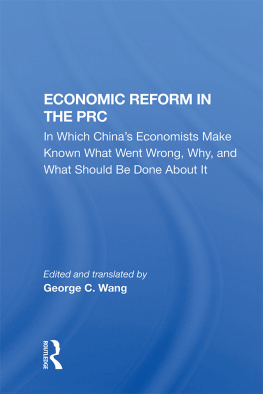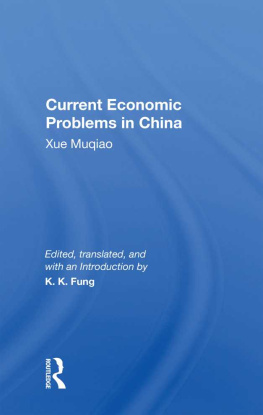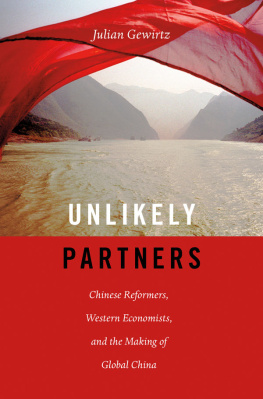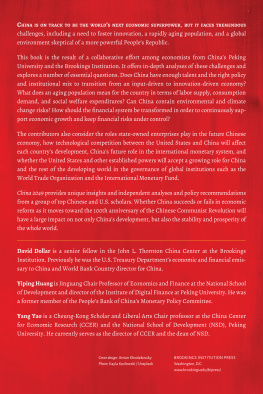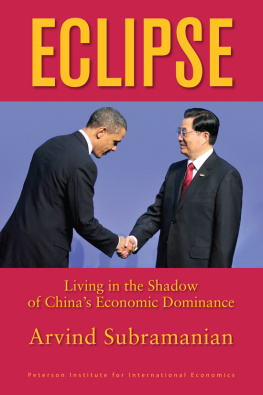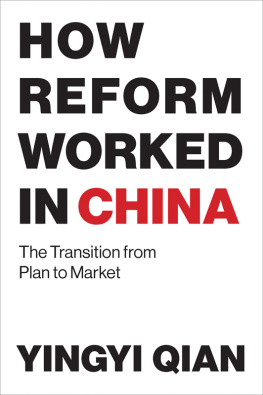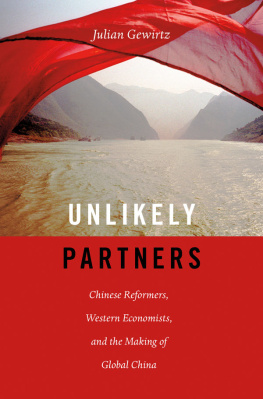ECONOMIC REFORM IN THE PRC
Also of Interest
China's Economic Development: Growth and Structural Change, Chuyuan Cheng
China Briefing, 1981, edited by Robert B. Oxnam and Richard C. Bush
The Chinese Agricultural Economy, edited by Randolph Barker and Radha P. Sinha
Food for One Billion: China's Agriculture Since 1949 , Robert C. Hsu
China: A Political History, 1917-1980, Fully Revised and Updated Edition, Richard C. Thornton
China Among the Nations of the Pacific, edited by Harrison Brown
China in World Affairs: The Foreign Policy of the PRC Since 1970, Golam W. Choudhury
Technology, Politics, and Society in China, Rudi Volti
China's Four Modernizations: The New Technological Revolution, edited by Richard Baum
Urban Development in Modern China, edited by Laurence J. C. Ma and Edward W. Hanten
Foreign Intervention and China's Economic Development, 1870-1911, Stephen C. Thomas
The Chinese Ministry of Foreign Affairs, 1968-1980: Revolutionary Politics Versus Continuity, Daniel Tretiak
China Geographer No. 11: Agriculture, edited by Clifton W. Pannell and Christopher Salter
The Chinese Military System: An Organizational Study of the Chinese People's Liberation Army, Second, Revised Edition, Harvey W. Nelsen
Huadong: The Story of a Chinese People's Commune, Gordon Bennett
China, the Soviet Union, and the West: Strategic and Political Dimensions for the 1980s, edited by Douglas T. Stuart and William T. Tow
Technology, Defense, and External Relations in China, 1975-1978, Harry G. Gelber
Available in hardcover and paperback.
Westview Special Studies on China and East Asia
Economic Reform in the PRC: In Which China's Economists Make Known What Went Wrong, Why, and What Should Be Done About It
edited and translated by George C. Wang
In February 1978, the post-Mao leadership revealed an ambitious ten-year program (1976-1985) with a $600 million capital outlay, aimed at propelling China into the front ranks of the industrialized nations by the year 2000 through the modernization of agriculture, industry, science and technology, and defense. The new leadership soon realized that such a program could hardly be implemented without reforming China's economic system, whichmodeled in the 1950s after that of the USSRhas been plagued by structural imbalance, inefficient management, and an overcommitment of resources to capital construction projects. By the end of 1978, a policy of "readjustment, consolidation, restructuring, and improvement of the economy" had been introduced.
In this book, distinguished Chinese economists offer candid analyses of the strengths and weaknesses of the present system. Their lucid and penetrating comments on the virtuesand drawbacksof that system lend insight to our comprehension of China's economic problems and the country's prospects for the future. Each article is based on firsthand information and data, much of which is available here (in English) for the first time.
George C. Wang is a professor in the School of Management and the Department of Economics, California State University, Dominguez Hills. While he was a Fulbright Senior Fellow and visiting professor at Hong Kong University, he conducted seminars at the Chinese Academy of Social Sciences in Beijing. Dr. Wang is author of Fundamentals of Political Economy (1977) and An Outline of the Compilation Work for an Input-Output Table for the People's Republic of China (1956).
Economic Reform in the PRC
In Which China's Economists Make Known What Went Wrong, Why, and What Should Be Done About It
edited and translated
by George C. Wang
First published 1982 by Westview Press, Inc.
Published 2018 by Routledge
52 Vanderbilt Avenue, New York, NY 10017
2 Park Square, Milton Park, Abingdon, Oxon OX14 4RN
Routledge is an imprint of the Taylor & Francis Group, an informa business
Copyright 1982 Taylor & Francis
All rights reserved. No part of this book may be reprinted or reproduced or utilised in any form or by any electronic, mechanical, or other means, now known or hereafter invented, including photocopying and recording, or in any information storage or retrieval system, without permission in writing from the publishers.
Notice:
Product or corporate names may be trademarks or registered trademarks, and are used only for identification and explanation without intent to infringe.
Library of Congress Cataloging in Publication Data
Economic reform in the PRC.
Bibliography: p.
Includes index.
Contents: China's economy in retrospect and prospects / Xue MuqiaoThe system of
economic management in a socialist country / Xue MuqiaoChina's modernization and
the prospects for its economy / Xu Dixin [etc.]
1. ChinaEconomic conditions 1949-1976Addresses, essays, lectures. 2. China
Economic conditions1976- Addresses, essays, lectures. 3. China
Economic Policy1949-1976Addresses, essays, lectures. 4. ChinaEconomic
policy1976- Addresses, essays, lectures. I. Wang, George C.
HC427.9.E34 338.951 82-4914
AACR2
ISBN 13: 978-0-367-01918-1 (hbk)
To: Jo Anne Pearl Andrew Kenneth James Joan
Contents
, George C. Wang
, Xue Muqiao
, Xue Muqiao
, Xu Dixin
, Dong Fuien
, He Jianzhang
, Liao Jili
, Liu Guoguang and Zhao Renwei
, Ji Chongwei
, Zhang Peiji
, Dong Furen
For a period of more than twenty years after the founding of the People's Republic of China in 1949, China maintained little contact with the Western world. The lack of dialogue, particularly between the United States and China, precluded any normalization of their strained relations. Because of the paucity of information, studies on China in the past were more pedagogic inferences based on secondhand sources than scientific research based on firsthand data.
On February 28, 1972, former President Richard Nixon and late Premier Zhou Enlai signed the Shanghai Communiqu, thus symbolizing the end of twenty-three years of containment and confrontation and the dawning of a new era of conciliation and rapprochement. In a short span of ten years, 1972-1981, the two countries established diplomatic relations and granted reciprocal most-favored-nation tariff treatment. Since the normalization of relations, the U.S.-China trade has grown by leaps and bounds; from a few million dollars in 1972 to probably over US$6 billion in 1981.
The two governments have also exchanged numerous delegations and scholars and have concluded several agreements, especially in the fields of science and management and in matters affecting trade relations. On December 28, 1979, thirteen social scientists and humanistsrepresenting the Joint Committee on Contemporary China (of the American Council of Learned Societies and the Social Science Research Council) and the Committee on Studies of Chinese Civilizationundertook a visit to China.
In March 1980, at the invitation of the Economic Information and Agency in Hong Kong, a Chinese economic delegation visited Hong Kong and conducted several seminars there, including one at the University of Hong Kong. Xu Dixin, vice-president of the Chinese Academy of Social Sciences, headed the delegation. Six papers were presented at the conference, covering China's economic policies in general and foreign trade and investment in particular.

